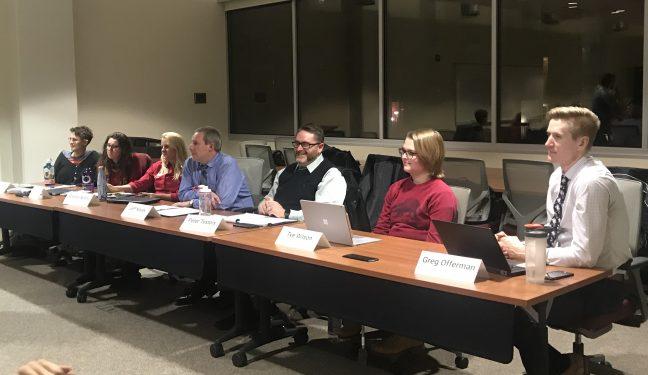In a town hall meeting organized by the Associated Students of Madison, panelists from University Housing and Dining addressed concerns over the meal plan and housing prices Wednesday.
University Housing Director Jeff Novak addressed concerns students had over the rising cost of living in residence halls and said with increasing operational costs, it was difficult to maintain the housing bills at the same rate.
“Every year, expenses do go up,” Novak said. “We get charged more utilities from the utility company. We get charged more for buying food that we serve in the dining halls. Everything. Staff would like raises.”
Novak said university housing is doing its best to keep their housing affordable despite the rising cost.
An audience member from ASM’s Equity and Inclusion Committee raised concerns about not having enough places on campus to reflect and pray.
Novak said that adding these spaces is a “priority.”
Other audience members raised concerns over the affordability of food at UW.
F.H. King Students for Sustainable Agriculture Programming Director Andrea Seiler, who also was a panelist, said the mandatory meal plan could negatively impact students with significant financial or dietary restrictions.
“My time trying to pursue a vegan and eating disorder recovery-friendly diet in dining was challenging for a number of reasons,” Seiler said. “One of them is financial inaccessibility.”
UW Dining and Culinary Services Director Peter Testory said the rise in commodity prices increases food costs.
Testory said the university’s food chain continues to face challenges — climate being a big one.
“We have to predict the best we can as to what those increases are going to look like,” Testory said.
Testory addressed questions regarding the introduction of new meal plans by University Housing this semester. He said the initiative gives residents greater freedom in choosing the meal plan which works best with their schedule and eating habits.
Testory also explained the process students with dietary, religious or financial restrictions must go through to opt-out.
The exemption process starts with contacting the Dining and Culinary Services office. If a student has a dietary or religious restriction, they then must meet with a dietitian.
A student with a financial restriction must first meet with Testory and have a one-on-one conversation with him to figure out how they will continue to eat and maintain a nutritious diet without the meal plan. They are then referred to meet with the financial aid office who makes its own decision.
If the university decides it cannot accommodate a dietary restriction, the student is then referred to the McBurney Disability Resource Center, which makes its own recommendation.
Testory said it’s “rare” that the university can’t accommodate a dietary restriction.
“Everyone who asked for an exemption this year has been granted an exemption,” Novak said.
Testory said the university can do one-on-one cooking with students who have multiple allergies or dietary restrictions.
The different meal plans were designed to cater toward the different kinds of students that live at UW, Testory added.
“We have the local student that goes home on a regular basis,” Testory said. “We have the student from surrounding states that may not go home as often. And then we have the international, East and West Coast students.”
Novak said University Housing is open to suggestions on how to improve housing and dining at UW.
Also at the town hall, ASM Sustainability Chair Katie Piel asked about possibly implementing sustainability trainings for first-year residents, like the mandatory alcohol and sexual assault trainings first-year students complete.
UW Housing Sustainability and Communication coordinator Breana Nehls said University Housing has incorporated various programs to continue its sustainability initiatives. For example, they train house fellows on how to make sustainable lifestyle choices.
“We often start the conversation with waste because we see that as something that is very tangible,” Nehls said. “People can see it. We all interact with that in our daily lives. That’s typically the starting point.”
In a statement, Legislative Affairs Chair Laura Downer said the town hall was successful in allowing students to “talk openly with decision makers about what real issues affect them.”
“I believe the Town Hall opened up the space for further conversation about affordability and sustainability on campus,” Downer said. “Our administrators should be accessible to students, so I hope to see more of these events in the future.”


